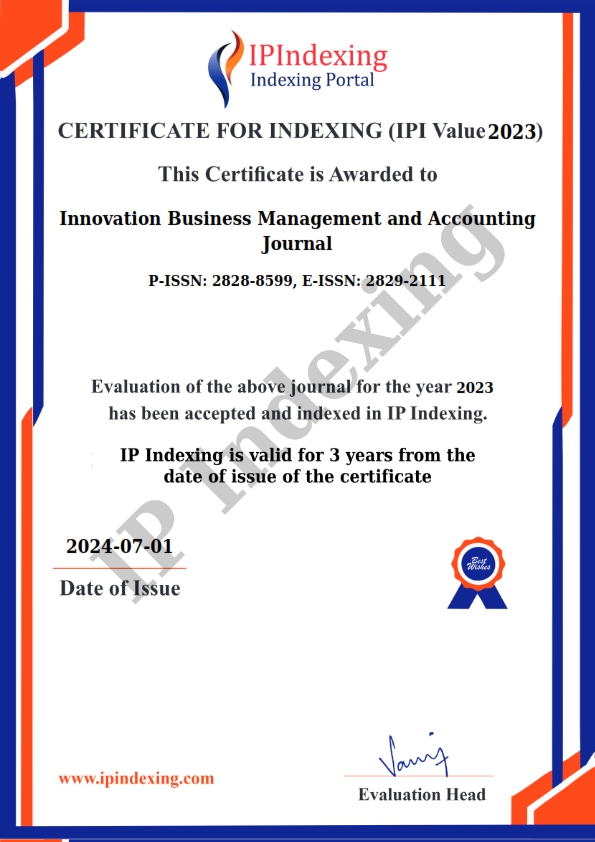Employee Engagement and Employee Motivation Among Manufacturing Firms in Nigeria
DOI:
https://doi.org/10.56070/ibmaj.2025.027Keywords:
Employee Engagement, Employee Motivation, Manufacturing FirmsAbstract
This study examined the relationship between employee engagement and employee motivation in selected manufacturing firms in Anambra State. The study was based on Resource-Based Theory (RBT) and employed a cross-sectional research design. The target population comprised 320 employees from various departments within the organizations. A sample size of 123 workers was determined using Taro Yamane’s (1967) formula. Data were collected through structured questionnaires administered to randomly selected employees from manufacturing firms in Anambra State. The reliability of the measurement instrument was assessed using Cronbach's Alpha. Descriptive statistics were used to present the data, while Pearson’s correlation coefficient was applied to test the hypotheses. The study revealed that employee engagement positively and significantly relates to employee motivation in selected manufacturing firms in Anambra State. In conclusion, a positive work environment driven by motivated employees can also contribute to lower turnover rates, which is particularly beneficial in an industry where retaining skilled workers is vital for sustained success. To leverage the link between engagement and motivation, the study recommends that firms should focus on creating an engaging workplace culture. This could involve regular feedback sessions, team-building activities, and ensuring that employees feel valued and involved in decision-making processes.
Downloads
References
Abner, I. P., & Samuel, U. E. (2019). Employee’s motivation in a competitive service and manufacturing sectors performance. Arabian Journal of Business and Management Review (Kuwait Chapter), 8(2), 30-39.
Ahuchogu, M. C., Sanyaolu, T. O., & Adeleke, A. G. (2024). Enhancing employee engagement in long-haul transport: Review of best practices and innovative approaches. Global Journal of Research in Science and Technology, 2(1), 046-060.
Alvarez, S. A., & Barney, J. B. (2017). Resource‐based theory and the entrepreneurial firm. Strategic entrepreneurship: Creating a new mindset, 87-105.
Bakker, A. B. (2019). Engagement and job performance: A closer look at the measurement of employee engagement. Journal of Managerial Psychology, 34(2), 111-124.
Bakker, A. B., & Albrecht, S. L. (2018). Work engagement: Current trends. Career Development International, 23(1), 4-11.
Bakker, A. B., & Demerouti, E. (2020). Job demands-resources theory: Taking stock and looking ahead. Journal of Occupational Health Psychology, 25(1), 3-14.
Bakker, A. B., & Leiter, M. P. (2020). Work engagement: A quantitative review. Journal of Applied Psychology, 105(1), 31-49.
Barney, J.B. (1991). Firm resources and sustained competitive advantage. Journal of Management, 17(1), 99–120.
Christian, M. S., Garza, A. S., & Slaughter, J. E. (2021). Work engagement: A quantitative review and test of its relations with task and contextual performance. Personnel Psychology, 74(1), 41-60.
Dobre, O. I. (2013). Employee motivation and organizational performance. Review of applied socio-economic research, 5(1).
Emeka, N., Amaka, O., & Ejim, E. P. (2015). The effect of employee motivation on organizational performance of selected manufacturing firms in Enugu state. World Journal of Management and Behavioral Studies, 3(1), 1-8.
Gilson, L. L., Mathieu, J. E., & Shalley, C. E. (2021). The role of leadership in fostering employee engagement and performance: A meta-analysis. Journal of Applied Psychology, 106(1), 74-95.
Ihionkhan, P.A. & Aigbomian, E.E. (2014). The Influence of Human Resource Management Practices on Organizational Commitment: A Study of Manufacturing Organizations in Nigeria. Indian Journal of Commerce and Management Studies, Educational Research Multimedia & Publications, 5(1), 18-28.
Judge, T.A., Zhang, S.C. & Glerum, D.R. (2020). Job satisfaction: Essentials of Job Attitudes and Other Workplace Psychological Constructs, 1st ed., Routledge, New York.
Macey, W. H., & Schneider, B. (2022). The meaning of employee engagement. Industrial and Organizational Psychology, 15(1), 3-30.
Macey, W.H. & Schneider, B. (2008b). The meaning of employee engagement. Industrial and Organizational Psychology. 1(1), 3-30.
Mehran, A. M., Mohamad, I. T., &Mohd, M. H. (2022). Employee motivation and performance of manufacturing firms in Malaysia. African Journal of Emerging Issues, 4(6), 14-23.
Nendi, I. (2024). Strategies to improve employee motivation and performance through the employee engagement program. Jurnal Ilmiah Akuntansi Kesatuan, 12(4), 505-512.
Presbitero, A., Fujimoto, Y., & Lim, W. M. (2025). Employee engagement and retention in multicultural work groups: The interplay of employee and supervisory cultural intelligence. Journal of Business Research, 186, 115012.
Rich, B. L., Lepine, J. A., & Crawford, E. R. (2019). Job engagement: Antecedents and effects on job performance. Academy of Management Journal, 53(3), 617-635.
Saks, A. M. (2020). Antecedents and consequences of employee engagement. Journal of Managerial Psychology, 31(1), 100-114.
Schaufeli, W. B., & Bakker, A. B. (2023). Work engagement: A multifaceted construct and its impact on performance and well-being. Annual Review of Organizational Psychology and Organizational Behavior, 4, 307-333.
Sentoso, A., & Muchsinati, E. S. (2024). Determining employee engagement and its influence on employee performance at holding state-owned enterprises insurance and guarantees Riau Islands region. Jurnal Manajemen Dan Pemasaran Jasa, 17(1), 39-58.
Shantz, A., & Elliott, M. N. (2020). The role of work-life balance in employee engagement and performance: A meta-analysis. Journal of Occupational Health Psychology, 25(2), 147-160.
Vance, R.J. (2012). Employee engagement and commitment. SHRM Foundation.
Wright, H. (2018). Why managing talent effectively improves business performance and reduces costs? : Retrieved from: https://www.rencaigroup.com/why-effective-talent-management-improves-business-performance-andreduces-costs/ on 14th February 2023.
Wright, T. A., & Cropanzano, R. (2023). The importance of meaningfulness of work: A review and meta-analysis. Journal of Applied Psychology, 108(1), 1-29.
Downloads
Published
How to Cite
Issue
Section
License
Copyright (c) 2025 Chinenye Maureen Nuel-Okoli, Ifeanyi Nuel Okoli

This work is licensed under a Creative Commons Attribution-ShareAlike 4.0 International License.



